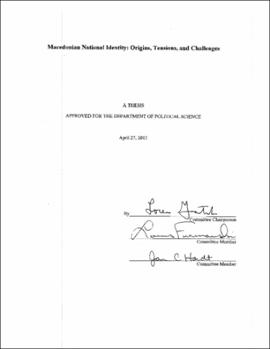| dc.contributor.advisor | Gatch, Loren, | |
| dc.contributor.author | Naumoski, Marija | |
| dc.date.accessioned | 2020-05-26T20:39:23Z | |
| dc.date.available | 2020-05-26T20:39:23Z | |
| dc.date.issued | 2012 | |
| dc.identifier.other | (AlmaMMSId)9978544185202196 | |
| dc.identifier.uri | https://hdl.handle.net/11244/324728 | |
| dc.description.abstract | During the Ottoman period Balkan collective identities existed without national content. As the historian Eric Hobsbawm has observed, the 'ethnicity of any people in southeastern Europe is an eternal matter of debate'. Throughout the 19th century, European nationalist impulses did influence this region, and some national narratives were legitimated with the establishment of new Balkan states. The Macedonian narrative was a conspicuous exception. In the interwar period (1918-1941), Macedonian nation-building efforts were instead characterized in negative terms as the 'Macedonian Question', and were framed as irredentist challenges to Balkan stability. The Macedonian narrative did not receive official validation until the establishment of the Yugoslav Republic of Macedonia by Josip Broz Tito in 1944, as part of the Socialist Federalist Republic Yugoslavia (SFRY). Tito's strategy for unifying a multiethnic SFRY involved sustaining a dynamic tension among the different national communities. As part of this strategy Tito paradoxically encouraged the affirmation of a Macedonian identity as a counterweight to the influence of other ethnic groups. It was Tito's aspiration that a new Yugoslavian identity would transcend the conflicting narratives of the constituent nationalisms that the SFRY encompassed. However, with the dissolution of the SFRY in 1992, and the subsequent declarations of independence by its constituent republics (including Macedonia), the legacy of Tito's strategy ironically set the stage for a revival of competing irredentist claims. The assertions of a 'Great Serbia', 'Great Macedonia', 'Great Albania', etc. are legacies of Tito's failed attempt to forge a stable Yugoslavian identity. In the present day, Balkan national narratives confront each other in mutually - constitutive antagonism. This paper argues that the Macedonian nation-building effort is not only an unfinished project, but represents a revived, 21st century version of the older 'Macedonian Question' that brings with it the potential for substantial regional conflict.--Abstract. | |
| dc.rights | All rights reserved by the author, who has granted UCO Chambers Library the non-exclusive right to share this material in its online repositories. Contact UCO Chambers Library's Digital Initiatives Working Group at diwg@uco.edu for the permission policy on the use, reproduction or distribution of this material. | |
| dc.title | Macedonian national identity : origins, tensions, and challenges. | |
| dc.type | Academic theses | |
| dc.contributor.committeeMember | Furmanski, Louis S. | |
| dc.contributor.committeeMember | Hardt, Jan | |
| dc.thesis.degree | M.A., Political Science | |
| dc.identifier.oclc | (OCoLC)ocn840653533 | |
| uco.group | UCO - Graduate Works and Theses::UCO - Theses | |
| thesis.degree.grantor | Jackson College of Graduate Studies | |
